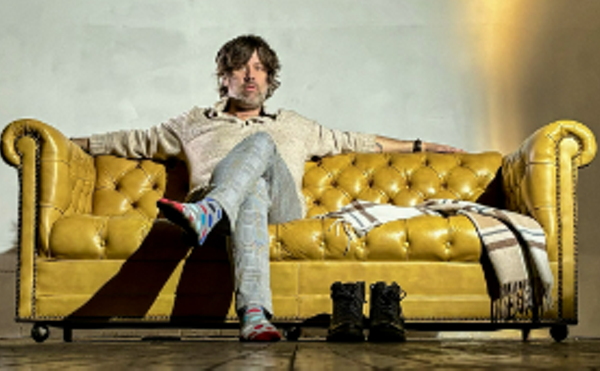"I've been playing music for 25 years, and I originally started out studying classical music," explains the 33-year-old descendant of Moby Dick author Herman Melville (hence the moniker; he was born Richard Melville Hall). "I played jazz and was in new-wave bands and punk rock bands. I was a hip-hop DJ for a while and was in a reggae band for a while. So, in those 25 years I've done a lot of different types of music, and I've never seen the reason to do one type of music [to] the exclusion of another. When I made Animal Rights, I didn't feel like I had abandoned other types of music to make a punk rock record, I just felt like that was sort of what my interests were at that moment. I like dance music, I like techno, I like electronic music, but I don't like it any more or any less than classical music or punk rock or hip-hop or whatever."
Whatever the reasoning behind that noisy misstep, Moby is set to release a new album, Play, on June 2, and it's a glorious return to his electronic roots. Merging elements of hip-hop, old-time spirituals, and a general embracing of all things electronic, it's devout Christian Moby's most personal and religious record to date.
"On a very naive level, when I make a record, I just try to make something that excites and appeals to me on an emotional level and hope that it will appeal to other people on that level," he says. "I wanted to make a record that people could use in their daily lives--a record that could serve as a soundtrack to people's lives. So, when making this record, there wasn't much of a concept except maybe making a record I was in love with."
Moby says that a few years ago, he was at a party at a friend's house and spotted a boxed set of old blues vocal recordings. He took them home, sampled them, and wrote songs around them. "The songs on the album that are based around these old vocals aren't blues songs, certainly not in the traditional sense, but the vocals were recorded [as early as] the '20s," he explains. Still, there's a certain rural, timeless groove to the songs that dazzlingly bridges old-school naturalism with new-style studio wizardry, especially on "Honey," Play's leadoff song and the first single from the album.
"The funny thing is, whether I'm making dance music or classical music or punk rock or whatever, I tend to always use the same equipment," Moby says. "So, for the actual making of this record, the process was quite similar to just about every other record I made. I just used some different sounds."
And different sounds is what Moby has been about ever since "Go," his groundbreaking 1991 single, rocked dance clubs across the globe with its cyclic, pounding beats and brainy undertones. It legitimized rave culture and sparked an underground revolution that the mainstream still has not caught up with. His breakthrough album, Everything Is Wrong, merely intensified those ideals, giving a heart and soul to the often cold world of techno DJ music.
He's a slave to the techno scene, this Moby. He still occasionally DJs around the country, lugging his record collection to clubs and spinning ninety-minute sets. "The ironic thing is that, although I make eclectic albums, when I DJ I tend to be completely un-eclectic," he laughs, adding that he prefers spinning house music and tries not to toss his own tracks into the mix ("I think there are a lot of other people in the world who make better dance records than I do"). "I take creating music a lot more seriously than I take DJing, when I just play records that I like."
Still, Moby maintains that his electronic forays mean no more to him than his journeys into other musical styles. But don't hold your breath for another total genre jump under the Moby banner anytime soon, he says. "I have a lot of punk rock and speed metal stuff written, but if I was put to out another album like that, I would probably put it out under a different name so I could be even more self-indulgent," he says. "Animal Rights was a very self-indulgent record."
So count out that classical album from Moby, and that reggae record, too (though he has scored some indie films and even released a compilation of movie music a couple years ago, I Like to Score, which included his revamped take on the James Bond theme). But even that doesn't seem to hold much interest for him. "On one hand, I'm really selfish," he explains. "I really like making my own records. So, in order for me to score a movie, it would have to be a really, really exciting idea, or it would have to be a situation where I could work really closely with the director in the actual development of the movie. I don't have much aspiration to be a film composer. I like making my own records."
Given the freedom by new label V2 (an indie with strong electro ties), he more or less now can create any type of album he chooses. "I like being able to make the records that I'm making now," he says. "The new album is fairly eclectic, so I don't feel the need right now to make a record that is just classical or that is just one type of genre. It's more fun being able to do something that is more emotionally diverse."
Former label Elektra wasn't a whale of a good time for Moby. And with the same careful wording that graces the liner notes of his albums (which have been a soapbox for Moby's lengthy pro-animal, vegan, Christian, etc. decrees), he recounts his distaste for major record labels. "Right now, I think major labels are a bad place for most musicians to be," he asserts, winding down. "If you're making a type of music that's being played on the radio a hundred times a day, then you probably should be on a major label. But if you're in any way idiosyncratic or different, I think a major label is an awful place to be. They're just not very musical at this point. They're interested in generating quarterly profits for the parent company. That's really about it."
Still, Moby found some salvation in the majors' fervent signing of electronica artists over the past couple of years. Hoping for a Seattle-esque jackpot, every techno artist worth his beeps and bips was scrutinized and rigged by nearly every single major record company (of course, in the end, only a few of those records--the Prodigy's, the Chemical Brothers'--amounted to anything).
"I thought the feeding frenzy was kind of exciting, because there is so much diversity in the world of electronic music, and I thought that perhaps out of that some good records might get made," he says. "What I think went wrong was that major labels were expecting something akin to the grunge revolution of the early '90s. And the thing with that was that bands like Nirvana and Soundgarden were quite conventional, in the sense that they made records that had verses and choruses and were very vocal-based, and they went on tour and made videos and did interviews. So it was sort of easy to sell millions of records with bands like that. But with electronic artists, they tend to be a lot more idiosyncratic and a lot more difficult to market in a conventional way."
Ironically, now that the media have all but given up on electronica, it seems to have risen, ever so slightly, from its own ashes. Fatboy Slim is all over the place--radio, TV commercials, movies--and great buzz has preceded Underworld's new album. Still, even though Moby claims he doesn't "feel any particular allegiance to that music," he shared his thoughts on the aforementioned twosome.
Fatboy Slim: "I like his singles but don't think I could sit down and listen to a whole Fatboy Slim album. I love hearing them in nightclubs and on the radio, but it's a little too aggressively lighthearted for me."
Underworld: "They approach it very differently than I do. They make great records, but all their records sound very similar. They're not very eclectic, which is not a bad thing, that's just how they approach music. If I had to make records like that, I think I would get bored after a while."
Moby's final thoughts on the subject are typically diplomatic and humble ones: "I think [other electronic artists] have similar interests [to what] I do, but they're probably just smarter. When you buy an Underworld record, you know what you're getting. They're consistent and good records, and they don't run the risk of confusing or alienating their fans.
"Every time I put out a record, I run that risk."
"Transformation 2" begins at 10 p.m. Saturday, April 17, at the Cleveland Sportsplex, 18909 SouthMiles Road. The contact line is 330-849-0413. Other acts include Run D.M.C., Richard Humpty Vission, James Christian, Danny the Wildchild, and J-Smooth.











